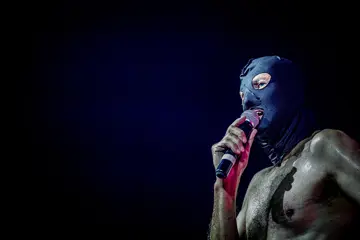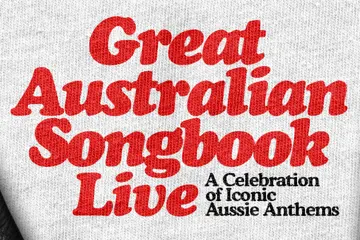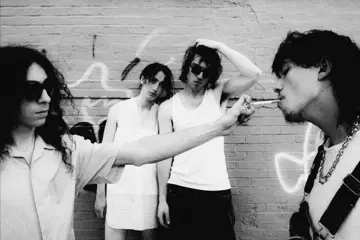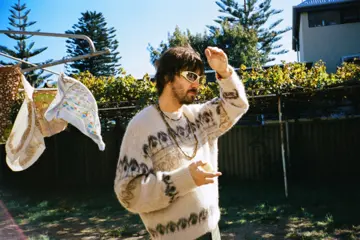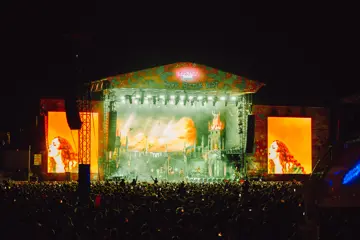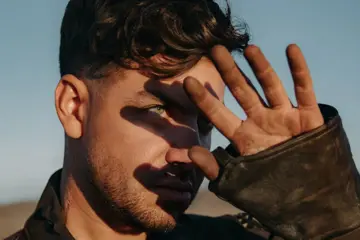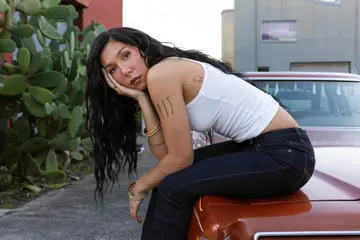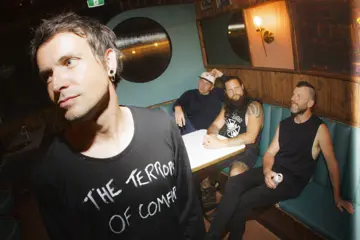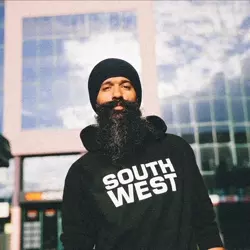 L-FRESH The LION
L-FRESH The LIONThe Australian hip hop scene is more diverse than ever with new voices and vibes - suburban BBQ rap relegated to the past. Yet Sydney's L-FRESH The LION (aka Sukhdeep Singh) is starting his own movement within a movement. The MC, and social activist, explores his multi-faceted identity as a Sikh Indian-Australian on Become - his premiere on Elefant Traks. And everyone is digging it. Become even made The Music's "Top 30 Albums Of 2016 (So Far)" list.
Although Become only materialised in May, Singh has already extensively toured behind it. The MC wrapped up a run supporting Elefant Traks visionary Tim "Urthboy" Levinson (together with avant 'n' B singer Okenyo), dates selling out. Now he has launched his own tour, just playing Darwin Festival alongside Sampa The Great. "It's been really positive so far," Singh enthuses. "It's been great vibes." Singh typically performs with singer/rapper Mirrah and DJ MK-1 - and, in bigger cities, his band. His main support is Omar Musa: MC, poet and novelist (Singh cameos on Musa's new EP Dead Centre).
Born in Liverpool, Sydney to Indian migrant parents, Singh grew up listening to American hip hop, relating to its outsider perspectives. "A lot of that had to do with that sense of feeling like I didn't belong - feeling like my voice was not being heard." Nevertheless, it wasn't his experience. "As much as I was feeling that sense of connection, there was still a part of me that felt that there was something missing in that story - because it wasn't my story necessarily." Singh resolved to tell his tale (the 'Lion' in his handle is a translation of the Sanskrit-derived Singh). Singh embarked on an Arts/Law degree, which he "still utilises". But, in music, he found his "purpose" as communicator.
"As much as I was feeling that sense of connection, there was still a part of me that felt that there was something missing in that story - because it wasn't my story necessarily."
Singh befriended his now chief collaborator Michael McGlynn while both were involved in a youth centre in South-West Sydney, setting up a studio. Singh "experimented" with him. He sought out McGlynn again when cutting his 2014 debut One and the producer released it via his Vienna People Records. McGlynn didn't have a hip-hop affiliation but, for Singh, that was a plus. "I wanted someone who didn't have that experience, who was gonna be able to contribute something completely different - [so] that we would build together in that way to be able to create something that was different. It was still hip hop, stylistically, but it was something that was gonna be a point of differentiation from everything else that was out there."
Don't miss a beat with our FREE daily newsletter
It was also in the youth-centre world where Singh encountered an important champion in KRS-One. The fabled New York MC, who visited Oz in 2012, gave a lecture and "hung out for a bit". "I was like, 'Hey, man, do you mind dropping something for the album?'," Singh laughs. "He's like, 'Sure!'" This resulted in One's intro. Alas, KRS-One has since become embroiled in controversy over allegations that his ally and electro pioneer Afrika Bambaataa sexually abused teen boys. KRS has consistently dismissed the charges as "gossip", and even "hate", while maintaining that it's irrelevant to Bambaataa's legacy. Singh, feeling conflicted, today distances himself from hip hop's "Teacha". "He's said some very questionable things, which I don't agree with."
In early 2015 it was announced that, on the back of One, Singh had signed to Elefant Traks. That August he issued the single Get Mine (with The Bombay Royale's Parvyn Kaur Singh) - a bhangra banger. He gigged internationally for the first time. Singh scheduled two shows in London, the second an opening slot for Hilltop Hoods - allowing him to suss out the UK underground. "It was a really nice introduction."
Finally this year Singh unleashed the ambitious Become - touted as "the prequel" to One. One established Singh as a 'conscious' and positive MC, but he aimed to express different, darker aspects of himself - "the fragility, the insecurity and sometimes the loss of hope or faith". Crucially, he addresses racism, discrimination and prejudice. On Hold Up Singh and Remi share awkward encounters with the culturally ignorant to comic effect (Sensible J produces). "The response has been equally as funny," Singh reveals. "Now, instead of people asking me if they can touch my beard in a kind of serious way, people who have heard the song articulate that question in the same way that I start the song. They're like, 'Yo, L, can I touch your beard?' in the same rhythm and tone!"
Become is a narrative album. On Panjab: An Introduction Singh chronicles the Sikhs' heritage, struggle and diaspora. The music, too, is expansive, traversing smooth '90s R&B (Pray For Me features hot Melbourne newcomer Tre Samuels), grunge rock and Punjabi hip hop. Singh has aired another single, 1 In 100,000 (the remix blessed by the UK's Raxstar), but believes that the best promotional strategy is to simply perform Become. "It's such a deep record; it's one of those things where people need to immerse themselves in it to really appreciate the journey from start to finish."
Until very recently Singh was living in Melbourne, serving as the Youth Empowerment Coordinator at the Asylum Seeker Resource Centre. "It was one of the most rewarding jobs I've ever had. It was one of the most challenging as well, but it was inspiring every day to be around people who were just so resilient and so strong, and who all have so much to offer and so much to give. And who want to give and who are hungry for opportunity and really appreciative of that." Singh realised how "privileged" he was. "It's like, 'Wow, okay, I'm a lucky one'. I was lucky to be born here and to have the family that I have and to have the comforts and the security that I have - and that's all it was, really. It was luck for that to happen."
However, with his music taking off, Singh had to quit the day job. Over summer he'll join the festival circuit, appearing at Festival Of The Sun and NYE On The Hill. Singh hopes to return overseas in 2017. "It's all being discussed at the moment and we'll kinda see what transpires," he teases. "It's definitely a part of the plan - I wanna do that."
Singh continues to intrigue and influence. The ABC's 7.30 interviewed him for a report on Australia's surging multicultural hip hop. Singh belongs to a fresh wave of hip hoppers who are about social protest as much as partying. In the US the resurgence of conscious rap has coincided with the rise of the #BlackLivesMatter movement. But hip hop is likewise responding to conversations about gender, sexuality and identity politics. "I think it's a sign of the times that we're in now; music's very reflective of what's happening around the world," Singh says. "For a lot of artists to be in tune with what's happening at the moment, it's natural now for music to take that path. It's what the world now demands from us. Some artists are rising to the occasion to speak where it's required. So that's really inspiring to see. It's also a call to action for everyday people - artists included - to be conscious of what they're doing, what they're participating in, and what their lives mean, and what impact it's having on the world around them."



